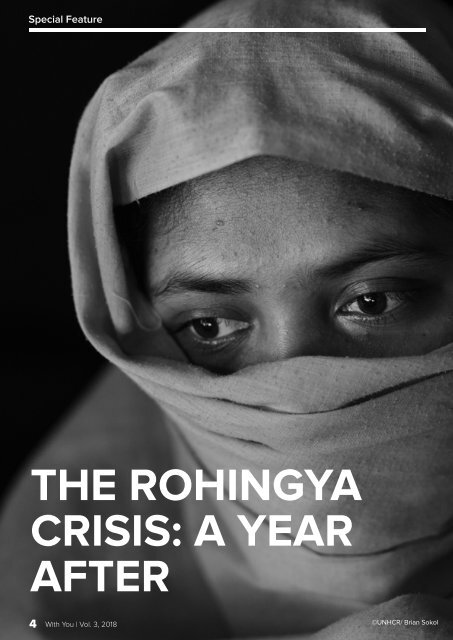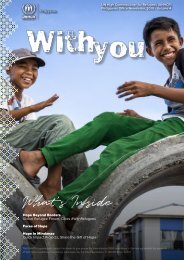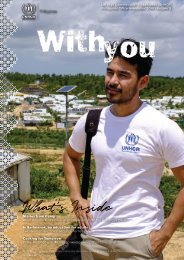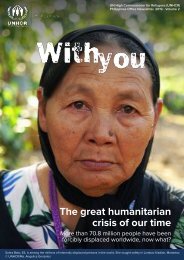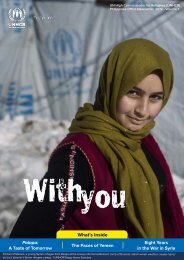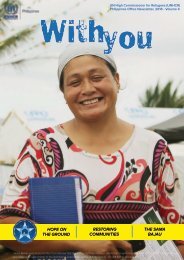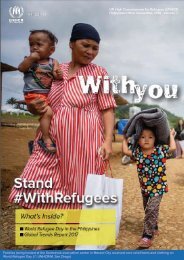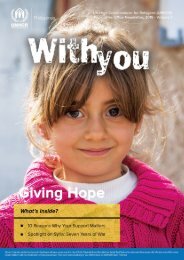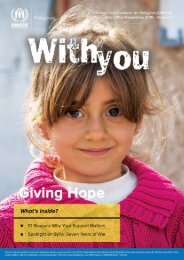You also want an ePaper? Increase the reach of your titles
YUMPU automatically turns print PDFs into web optimized ePapers that Google loves.
Special Feature<br />
Special Feature<br />
It has been 13 months since one of the worst<br />
humanitarian crisis of our time erupted. On 25 August<br />
<strong>2018</strong>, hundreds of thousands of the Rohingya people<br />
began their long and grueling journey towards safety.<br />
More than 700,000 Rohingya refugees fled from their<br />
home in Myanmar due to the inhuman violence that<br />
broke out in the Rakhine state.<br />
searched for the infant’s family, but no one claimed<br />
him in the site. She and her husband now take care<br />
of the baby. They named Mohammed Hasan, after<br />
the prophet Mohammed’s grandson. She hopes that<br />
Mohammed will grow up to become a strong man.<br />
OMAR<br />
The men, women, and children who fled recounted<br />
stories of trauma. Yet, they also share stories of the<br />
most important things they took with them and their<br />
dreams for the future.<br />
KALIMA*<br />
The 20-year-old says that nothing is important to her<br />
after the hardships that she faced in Myanmar. She<br />
was a tailor in her village when armed men came and<br />
began shooting people. They burned houses, and<br />
killed villlagers and left a trail of destruction in their<br />
wake.<br />
“I don’t know why Allah did not let me die,” Kalima<br />
said. She was married for three months when she<br />
witnessed the men slaughter people in her village.<br />
Kalima recalls how her children and houses were<br />
set on fire, how her husband and little sister were<br />
killed. She was then brutally beaten and raped before<br />
being knocked unconscious. Kalima escaped with<br />
her brother and cousin. They walked for three days<br />
before arriving to Bangladesh.<br />
Omar was 102-years-old when he was forced to<br />
flee because of the attacks and brutal killings in a<br />
neighboring village. The blind man escaped with<br />
other members of his village, bringing with him a<br />
walking stick.<br />
Leaving his village was the hardest thing he had<br />
ever done. But now, Omar is reunited with his family<br />
in a camp. He feels safe and at peace.<br />
Kalima, Nuras, and Omar are some of the 720,000<br />
Rohingya refugees living in Bangladesh. It is through<br />
your generosity and kindness that UNHCR is able<br />
to restore hope to many of the most vulnerable<br />
Rohingya families who have lost everything.<br />
*name changed for protection<br />
YOUR HELP IN NUMBERS<br />
Inspite of going through such unspeakable horror,<br />
Kalima still manages to smile when asked about her<br />
talents as a dressmaker. “Anything you need,” she<br />
says when asked about what she can tailor. She<br />
dreams of one day being able to sew again.<br />
600,000 Rohingya refugees<br />
in Kutupalong, the largest resettlement site<br />
THE ROHINGYA<br />
CRISIS: A YEAR<br />
AFTER<br />
Icons by Freepik and mynamepong from Flaticon<br />
NURAS<br />
Nuras, a 25-year-old mother recalls how her<br />
neighbors were slaughtered as they tried to flee<br />
from their houses. Nuras and her four children ran<br />
away from their homes as they were chased and<br />
fired at. She ran with her four children to escape the<br />
massacre of her village.<br />
As she was fleeing, she heard the sound of a baby<br />
crying nearby. The infant was dry, flailing, and<br />
huddled between two dead bodies in a rice paddy.<br />
She took the child in her arms and resumed the<br />
journey with her children. They walked for days until<br />
they reached the Bangladeshi border where she<br />
was reunited with her husband who fled earlier. They<br />
267 learning centers<br />
37,400 families<br />
relocated to safer ground<br />
440 wells and pumps<br />
provide safe and clean water<br />
250,000 refugees<br />
access to primary healthcare<br />
22 nutrition centers<br />
for mothers and children<br />
43,853 hygiene kits<br />
4 With You | Vol. 3, <strong>2018</strong><br />
©UNHCR/ Brian Sokol<br />
Sources: PSP Emergency Content Package, August <strong>2018</strong> and<br />
UNHCR Bangladesh Refugee Emergency Factsheet—Energy & Environment, August <strong>2018</strong><br />
With You | Vol. 3, <strong>2018</strong><br />
5


